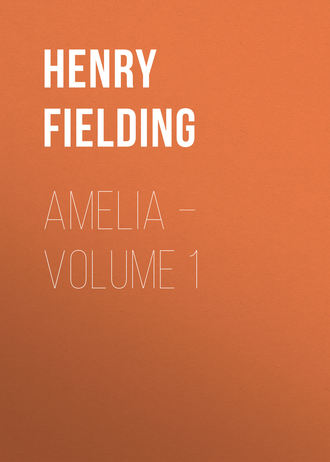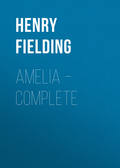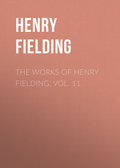
Генри Филдинг
Amelia – Volume 1
Chapter xii.
In which Mr. Booth concludes his story
"The next day the doctor set out for his parsonage, which was about thirty miles distant, whither Amelia and myself accompanied him, and where we stayed with him all the time of his residence there, being almost three months.
"The situation of the parish under my good friend's care is very pleasant. It is placed among meadows, washed by a clear trout-stream, and flanked on both sides with downs. His house, indeed, would not much attract the admiration of the virtuoso. He built it himself, and it is remarkable only for its plainness; with which the furniture so well agrees, that there is no one thing in it that may not be absolutely necessary, except books, and the prints of Mr. Hogarth, whom he calls a moral satirist.
"Nothing, however, can be imagined more agreeable than the life that the doctor leads in this homely house, which he calls his earthly paradise. All his parishioners, whom he treats as his children, regard him as their common father. Once in a week he constantly visits every house in the parish, examines, commends, and rebukes, as he finds occasion. This is practised likewise by his curate in his absence; and so good an effect is produced by this their care, that no quarrels ever proceed either to blows or law-suits; no beggar is to be found in the whole parish; nor did I ever hear a very profane oath all the time I lived in it. "But to return from so agreeable a digression, to my own affairs, that are much less worth your attention. In the midst of all the pleasures I tasted in this sweet place and in the most delightful company, the woman and man whom I loved above all things, melancholy reflexions concerning my unhappy circumstances would often steal into my thoughts. My fortune was now reduced to less than forty pounds a-year; I had already two children, and my dear Amelia was again with child.
"One day the doctor found me sitting by myself, and employed in melancholy contemplations on this subject. He told me he had observed me growing of late very serious; that he knew the occasion, and neither wondered at nor blamed me. He then asked me if I had any prospect of going again into the army; if not, what scheme of life I proposed to myself?
"I told him that, as I had no powerful friends, I could have but little expectations in a military way; that I was as incapable of thinking of any other scheme, as all business required some knowledge or experience, and likewise money to set up with; of all which I was destitute.
"'You must know then, child,' said the doctor, 'that I have been thinking on this subject as well as you; for I can think, I promise you, with a pleasant countenance.' These were his words. 'As to the army, perhaps means might be found of getting you another commission; but my daughter seems to have a violent objection to it; and to be plain, I fancy you yourself will find no glory make you amends for your absence from her. And for my part,' said he, 'I never think those men wise who, for any worldly interest, forego the greatest happiness of their lives. If I mistake not,' says he, 'a country life, where you could be always together, would make you both much happier people.'
"I answered, that of all things I preferred it most; and I believed Amelia was of the same opinion.
"The doctor, after a little hesitation, proposed to me to turn farmer, and offered to let me his parsonage, which was then become vacant. He said it was a farm which required but little stock, and that little should not be wanting.
"I embraced this offer very eagerly, and with great thankfulness, and immediately repaired to Amelia to communicate it to her, and to know her sentiments.
"Amelia received the news with the highest transports of joy; she said that her greatest fear had always been of my entring again into the army. She was so kind as to say that all stations of life were equal to her, unless as one afforded her more of my company than another. 'And as to our children,' said she, 'let us breed them up to an humble fortune, and they will be contented with it; for none,' added my angel, 'deserve happiness, or, indeed, are capable of it, who make any particular station a necessary ingredient.'"
"Thus, madam, you see me degraded from my former rank in life; no longer Captain Booth, but farmer Booth at your service.
"During my first year's continuance in this new scene of life, nothing, I think, remarkable happened; the history of one day would, indeed, be the history of the whole year."
"Well, pray then," said Miss Matthews, "do let us hear the history of that day; I have a strange curiosity to know how you could kill your time; and do, if possible, find out the very best day you can."
"If you command me, madam," answered Booth, "you must yourself be accountable for the dulness of the narrative. Nay, I believe, you have imposed a very difficult task on me; for the greatest happiness is incapable of description.
"I rose then, madam – "
"O, the moment you waked, undoubtedly," said Miss Matthews.
"Usually," said he, "between five and six."
"I will have no usually," cried Miss Matthews, "you are confined to a day, and it is to be the best and happiest in the year."
"Nay, madam," cries Booth, "then I must tell you the day in which Amelia was brought to bed, after a painful and dangerous labour; for that I think was the happiest day of my life."
"I protest," said she, "you are become farmer Booth, indeed. What a happiness have you painted to my imagination! you put me in mind of a newspaper, where my lady such-a-one is delivered of a son, to the great joy of some illustrious family."
"Why then, I do assure you, Miss Matthews," cries Booth, "I scarce know a circumstance that distinguished one day from another. The whole was one continued series of love, health, and tranquillity. Our lives resembled a calm sea." —
"The dullest of all ideas," cries the lady.
"I know," said he, "it must appear dull in description, for who can describe the pleasures which the morning air gives to one in perfect health; the flow of spirits which springs up from exercise; the delights which parents feel from the prattle and innocent follies of their children; the joy with which the tender smile of a wife inspires a husband; or lastly, the chearful, solid comfort which a fond couple enjoy in each other's conversation? – All these pleasures and every other of which our situation was capable we tasted in the highest degree. Our happiness was, perhaps, too great; for fortune seemed to grow envious of it, and interposed one of the most cruel accidents that could have befallen us by robbing us of our dear friend the doctor."
"I am sorry for it," said Miss Matthews. "He was indeed a valuable man, and I never heard of his death before."
"Long may it be before any one hears of it!" cries Booth. "He is, indeed, dead to us; but will, I hope, enjoy many happy years of life. You know, madam, the obligations he had to his patron the earl; indeed, it was impossible to be once in his company without hearing of them. I am sure you will neither wonder that he was chosen to attend the young lord in his travels as his tutor, nor that the good man, however disagreeable it might be (as in fact it was) to his inclination, should comply with the earnest request of his friend and patron.
"By this means I was bereft not only of the best companion in the world, but of the best counsellor; a loss of which I have since felt the bitter consequence; for no greater advantage, I am convinced, can arrive to a young man, who hath any degree of understanding, than an intimate converse with one of riper years, who is not only able to advise, but who knows the manner of advising. By this means alone, youth can enjoy the benefit of the experience of age, and that at a time of life when such experience will be of more service to a man than when he hath lived long enough to acquire it of himself.
"From want of my sage counsellor, I now fell into many errors. The first of these was in enlarging my business, by adding a farm of one hundred a year to the parsonage, in renting which I had also as bad a bargain as the doctor had before given me a good one. The consequence of which was, that whereas, at the end of the first year, I was worth upwards of fourscore pounds; at the end of the second I was near half that sum worse (as the phrase is) than nothing.
"A second folly I was guilty of in uniting families with the curate of the parish, who had just married, as my wife and I thought, a very good sort of a woman. We had not, however, lived one month together before I plainly perceived this good sort of a woman had taken a great prejudice against my Amelia, for which, if I had not known something of the human passions, and that high place which envy holds among them, I should not have been able to account, for, so far was my angel from having given her any cause of dislike, that she had treated her not only with civility, but kindness.
"Besides superiority in beauty, which, I believe, all the world would have allowed to Amelia, there was another cause of this envy, which I am almost ashamed to mention, as it may well be called my greatest folly. You are to know then, madam, that from a boy I had been always fond of driving a coach, in which I valued myself on having some skill. This, perhaps, was an innocent, but I allow it to have been a childish vanity. As I had an opportunity, therefore, of buying an old coach and harness very cheap (indeed they cost me but twelve pounds), and as I considered that the same horses which drew my waggons would likewise draw my coach, I resolved on indulging myself in the purchase.
"The consequence of setting up this poor old coach is inconceivable. Before this, as my wife and myself had very little distinguished ourselves from the other farmers and their wives, either in our dress or our way of living, they treated us as their equals; but now they began to consider us as elevating ourselves into a state of superiority, and immediately began to envy, hate, and declare war against us. The neighbouring little squires, too, were uneasy to see a poor renter become their equal in a matter in which they placed so much dignity; and, not doubting but it arose in me from the same ostentation, they began to hate me likewise, and to turn my equipage into ridicule, asserting that my horses, which were as well matched as any in the kingdom, were of different colours and sizes, with much more of that kind of wit, the only basis of which is lying.
"But what will appear most surprizing to you, madam, was, that the curate's wife, who, being lame, had more use of the coach than my Amelia (indeed she seldom went to church in any other manner), was one of my bitterest enemies on the occasion. If she had ever any dispute with Amelia, which all the sweetness of my poor girl could not sometimes avoid, she was sure to introduce with a malicious sneer, 'Though my husband doth not keep a coach, madam.' Nay, she took this opportunity to upbraid my wife with the loss of her fortune, alledging that some folks might have had as good pretensions to a coach as other folks, and a better too, as they brought a better fortune to their husbands, but that all people had not the art of making brick without straw.
"You will wonder, perhaps, madam, how I can remember such stuff, which, indeed, was a long time only matter of amusement to both Amelia and myself; but we at last experienced the mischievous nature of envy, and that it tends rather to produce tragical than comical events. My neighbours now began to conspire against me. They nicknamed me in derision, the Squire Farmer. Whatever I bought, I was sure to buy dearer, and when I sold I was obliged to sell cheaper, than any other. In fact, they were all united, and, while they every day committed trespasses on my lands with impunity, if any of my cattle escaped into their fields, I was either forced to enter into a law-suit or to make amends fourfold for the damage sustained.
"The consequences of all this could be no other than that ruin which ensued. Without tiring you with particulars, before the end of four years I became involved in debt near three hundred pounds more than the value of all my effects. My landlord seized my stock for rent, and, to avoid immediate confinement in prison, I was forced to leave the country with all that I hold dear in the world, my wife and my poor little family.
"In this condition I arrived in town five or six days ago. I had just taken a lodging in the verge of the court, and had writ my dear Amelia word where she might find me, when she had settled her affairs in the best manner she could. That very evening, as I was returning home from a coffee-house, a fray happening in the street, I endeavoured to assist the injured party, when I was seized by the watch, and, after being confined all night in the round-house, was conveyed in the morning before a justice of peace, who committed me hither; where I should probably have starved, had I not from your hands found a most unaccountable preservation. – And here, give me leave to assure you, my dear Miss Matthews, that, whatever advantage I may have reaped from your misfortune, I sincerely lament it; nor would I have purchased any relief to myself at the price of seeing you in this dreadful place."
He spake these last words with great tenderness; for he was a man of consummate good nature, and had formerly had much affection for this young lady; indeed, more than the generality of people are capable of entertaining for any person whatsoever.
BOOK IV
Chapter i.
Containing very mysterious matter
Miss Matthews did not in the least fall short of Mr. Booth in expressions of tenderness. Her eyes, the most eloquent orators on such occasions, exerted their utmost force; and at the conclusion of his speech she cast a look as languishingly sweet as ever Cleopatra gave to Antony. In real fact, this Mr. Booth had been her first love, and had made those impressions on her young heart, which the learned in this branch of philosophy affirm, and perhaps truly, are never to be eradicated.
When Booth had finished his story a silence ensued of some minutes; an interval which the painter would describe much better than the writer. Some readers may, however, be able to make pretty pertinent conjectures by what I have said above, especially when they are told that Miss Matthews broke the silence by a sigh, and cried, "Why is Mr. Booth unwilling to allow me the happiness of thinking my misfortunes have been of some little advantage to him? sure the happy Amelia would not be so selfish to envy me that pleasure. No; not if she was as much the fondest as she is the happiest of women." "Good heavens! madam," said he, "do you call my poor Amelia the happiest of women?" "Indeed I do," answered she briskly. "O Mr. Booth! there is a speck of white in her fortune, which, when it falls to the lot of a sensible woman, makes her full amends for all the crosses which can attend her. Perhaps she may not be sensible of it; but if it had been my blest fate – O Mr. Booth! could I have thought, when we were first acquainted, that the most agreeable man in the world had been capable of making the kind, the tender, the affectionate husband – happy Amelia, in those days, was unknown; Heaven had not then given her a prospect of the happiness it intended her; but yet it did intend it her; for sure there is a fatality in the affairs of love; and the more I reflect on my own life, the more I am convinced of it. – O heavens! how a thousand little circumstances crowd into my mind! When you first marched into our town, you had then the colours in your hand; as you passed under the window where I stood, my glove, by accident, dropt into the street; you stoopt, took up my glove, and, putting it upon the spike belonging to your colours, lifted it up to the window. Upon this a young lady who stood by said, 'So, miss, the young officer hath accepted your challenge.' I blushed then, and I blush now, when I confess to you I thought you the prettiest young fellow I had ever seen; and, upon my soul, I believe you was then the prettiest fellow in the world." Booth here made a low bow, and cried, "O dear madam, how ignorant was I of my own happiness!" "Would you really have thought so?" answered she. "However, there is some politeness if there be no sincerity in what you say." – Here the governor of the enchanted castle interrupted them, and, entering the room without any ceremony, acquainted the lady and gentleman that it was locking-up time; and, addressing Booth by the name of captain, asked him if he would not please to have a bed; adding, that he might have one in the next room to the lady, but that it would come dear; for that he never let a bed in that room under a guinea, nor could he afford it cheaper to his father.
No answer was made to this proposal; but Miss Matthews, who had already learnt some of the ways of the house, said she believed Mr. Booth would like to drink a glass of something; upon which the governor immediately trumpeted forth the praises of his rack-punch, and, without waiting for any farther commands, presently produced a large bowl of that liquor.
The governor, having recommended the goodness of his punch by a hearty draught, began to revive the other matter, saying that he was just going to bed, and must first lock up. – "But suppose," said Miss Matthews, with a smile, "the captain and I should have a mind to sit up all night." – "With all my heart," said the governor; "but I expect a consideration for those matters. For my part, I don't enquire into what doth not concern me; but single and double are two things. If I lock up double I expect half a guinea, and I'm sure the captain cannot think that's out of the way; it is but the price of a bagnio."
Miss Matthews's face became the colour of scarlet at those words. However, she mustered up her spirits, and, turning to Booth, said, "What say you, captain? for my own part, I had never less inclination to sleep; which hath the greater charms for you, the punch or the pillow?" – "I hope, madam," answered Booth, "you have a better opinion of me than to doubt my preferring Miss Matthews's conversation to either." – "I assure you," replied she, "it is no compliment to you to say I prefer yours to sleep at this time."
The governor, then, having received his fee, departed; and, turning the key, left the gentleman and the lady to themselves.
In imitation of him we will lock up likewise a scene which we do not think proper to expose to the eyes of the public. If any over-curious readers should be disappointed on this occasion, we will recommend such readers to the apologies with which certain gay ladies have lately been pleased to oblige the world, where they will possibly find everything recorded that past at this interval.
But, though we decline painting the scene, it is not our intention to conceal from the world the frailty of Mr. Booth, or of his fair partner, who certainly past that evening in a manner inconsistent with the strict rules of virtue and chastity.
To say the truth, we are much more concerned for the behaviour of the gentleman than of the lady, not only for his sake, but for the sake of the best woman in the world, whom we should be sorry to consider as yoked to a man of no worth nor honour. We desire, therefore, the good- natured and candid reader will be pleased to weigh attentively the several unlucky circumstances which concurred so critically, that Fortune seemed to have used her utmost endeavours to ensnare poor Booth's constancy. Let the reader set before his eyes a fine young woman, in a manner, a first love, conferring obligations and using every art to soften, to allure, to win, and to enflame; let him consider the time and place; let him remember that Mr. Booth was a young fellow in the highest vigour of life; and, lastly, let him add one single circumstance, that the parties were alone together; and then, if he will not acquit the defendant, he must be convicted, for I have nothing more to say in his defence.







